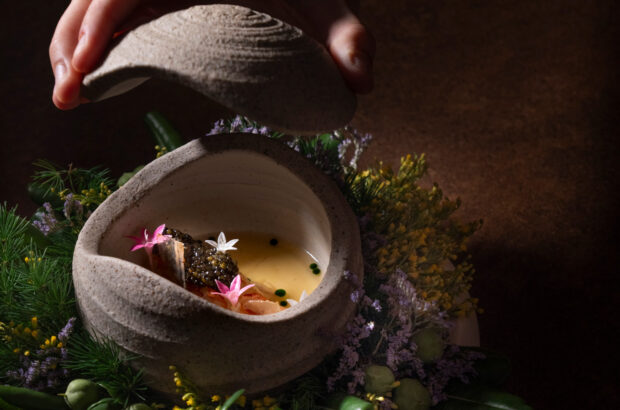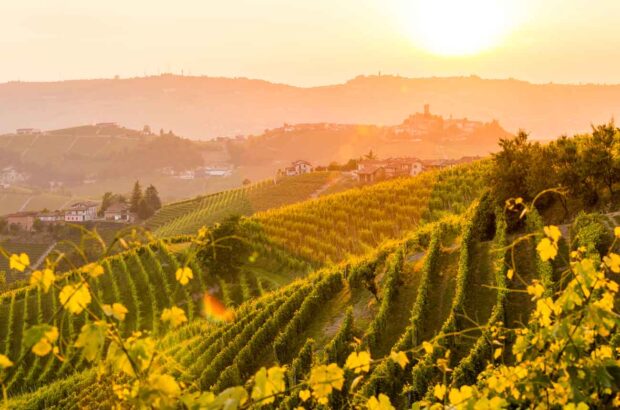Some English wineries have been preparing to restart vineyard tours for guests after UK prime minister Boris Johnson announced a raft of new post-lockdown measures from Saturday 4 July – including the reopening of pubs and restaurants in England.
Who is reopening for tours?
Gusbourne said it was set to resume its vineyard tours from 4 July, and would launch a picnic experience at private spots in its vineyards.
But the estate won’t ‘fully’ resume its usual estate tours and events until 1 August.
Ahead of many of its peers, the Kent and Sussex-based producer started welcoming guests back to the estate from the 8 June for self-guided vineyard tours.
Cellar door purchases have also remained open, while interactions are ‘kept at minimum’ and ‘entirely in outdoor environments’, a spokesperson told Decanter.com.
Northeast of Gusbourne, Simpsons Wine Estate in Kent also planned to reopen for tours and tastings from the beginning of July.
‘First priority will be given to those who had already booked and paid only to have their event cancelled over the past two months,’ said Ruth Simpson, adding that other customers can also start to register their interest.
Jenkyn Place, based in Hampshire, said it would restart vineyard tours from 11 July, but with additional slots.
‘In order to safely run tours, and to fit in all the people who had planned to visit us March to July, we will be adding a lot more tours to the diary, and keeping them at much smaller numbers,’ said Camilla Jennings, sales and marketing manager at Jenkyn Place.
Langham Wine Estate in Dorset has also said it will welcome guests to pick up pre-ordered picnics to enjoy in the vines. It’s bottle shop will ‘operate on a strict one-way system’ and only allow one customer at a time, according to its website.
There are also producers taking a more cautious approach towards reopening their gates.
Nyetimber decided to cancel its usual summer open days due to the pandemic, head winemaker Cherie Spriggs told Decanter.com. The West Sussex-based producer’s vineyards are not open to the public.
Blackbook, an urban winery located in a Victorian railway arch in London, is yet to announce a schedule to restart its urban winery experience.
‘We would hope to continue to connect with our market and provide the best and safest way of doing so,’ said winemaker Sergio Verrillo.
‘Whether this is through continued virtual tastings or via our socially distancing tours and events, we aim to provide experiences conducive to an urban environment.’
In Wales, officials have taken a more cautious approach to easing the lockdown, and so wineries there will need to comply with local regulations.
Difficult times
The producers are keen to get back on their feet after an extraordinary time of uncertainly due to the global pandemic.
In a May 2020 report, researchers from University of Edinburgh Business School surveyed 92 English and Welsh vineyards on the initial impact of Covid-19.
The research, in partnership with the trade body Wine GB, found that two thirds of the producers surveyed had cash flow concerns and 62% of those experiencing cash flow issues have used personal savings or retained earnings to keep their business going.
Producers expect a 52% drop in revenue on average, and 75% of respondents said they had delayed investment plans. One quarter of respondents had reduced their overall staff headcount by late April 2020, despite the UK Government’s furlough scheme.
‘The major impact (of the pandemic) has been felt in our sales,’ Verrillo, of Blackbook, told Decanter.com.
‘Restaurant closures have eliminated a major part of our revenue stream, as trade accounted for 75% of our revenue, so we needed to act fast and pivot to consumer focused sales.’
A surge in online wine sales during the lockdown means producers that already had a digital presence have had an advantage in coping with the crisis.
Through digital campaigns, including Instagram live, Facebook events, Zoom tastings, some producers have reported significant growth of direct sales online.
‘The impact of the Covid-19 on the hospitality trade is obvious and we definitely do miss this business,’ said Ruth Simpson.
‘We do however also trade with retail customers such as Waitrose, Majestic and Naked Wines, so have seen an uplift from these businesses, who are doing very well from the move to online ordering and home delivery.’
The trade research also coincides her observation. Among the producers surveyed who already have an online presence, two thirds have seen sales grow by 25% on average.
Labour shortages in the vineyard
In addition to the disruption in supply chains, a major stress has also been the shortage of labour in the vineyards. A significant number of seasonal vineyard workers returned to their homes in Eastern Europe when the virus took hold.
At Jenkyn Place, Jennings, along with her father founder Simon Bladon, sought to fill the gap as best as possible. ‘We needed to find everyone we could to help us doing the tying down, bud running and tucking in,’ said Jennings.
‘In the long-term the serious question for our industry is whether these workers will return in sufficient numbers to fill the labour gap,’ added Simpson.
She also said that the team had to bring forward the purchase of glass bottles and stillages ‘at terrible exchange rates’, so as to complete the tirage of the 2019 vintage during May.
By end of June, the team received the much-needed French mobile disgorgement lines for their 2017 and 2018 vintages. ‘These units are thankfully exempt from the quarantine,’ she said.
A silver lining?
However, many producers have also noted that the lockdown period has brought them closer to their key partners and consumers.
‘There has been notable support for the English wine community from a wide range of those in the wine and wider media too, which we are all extremely grateful for,’ according to Gusbourne.
Simpson also seconded the domestic support, adding that there might also be export opportunities in countries ‘reopening at a faster rate than the UK’, such as those in Scandinavia.
‘These have been very tough times and we look forward to more normal times returning,’ said Nyetimber’s Spriggs.







